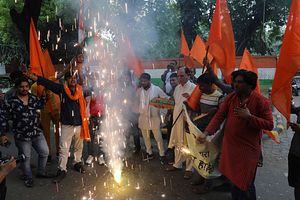Et tu, India? New Delhi has suspended the special status of Jammu and Kashmir, a disputed region also claimed by Pakistan. It did so in a way reminiscent of an authoritarian state, not the secular democracy envisioned by India’s founders.
The government flooded Srinagar, the summer capital of the state, with tens of thousands of troops. Tourists were told to leave – our attempt to visit Srinagar was abruptly revoked by the Ministry of Defense – a curfew imposed, and internet turned off. Several of Kashmir’s political leaders were detained, to muzzle them from fomenting unrest.
There is a wave of triumphalist nationalism spreading across nominally secular democracies like India. It rears its ugly Trumpian head in India as a virulent form of what Kanchan Chandra calls “Hindu Majoritarianism,” anchoring itself in slogans that espouse a revisionist history of victimhood of the party in power. In India, it is the cry, “Modi hai to Mumkin hai (Modi Can Make it Possible).” In the United States, it is “Make America Great Again.”
There is also a whiff of toxic masculinity present, with some male chauvinists boasting on social media they will take on Kashmiri brides as a way to religiously purge India’s only majority-Muslim province. India’s Bharatiya Janata Party (BJP)-ruled government has shown little tolerance for criticism. Also, there has been no accountability for serious allegations of human rights violations by Indian troops in Kashmir, including enforced disappearances, torture and extrajudicial killings. Opposition leaders have been detained and freedom of speech curtailed. As one Kashmiri put it, “India wants Kashmir but not Kashmiris.”
The argument from India’s elite is that the article revoked on Kashmir’s statehood status was a constitutional vestige from a bygone era that will allow investment to flow into Kashmir. Investment will bring jobs, tourists, and stability. What’s more, the status quo of the past seven decades of semi-autonomous rule has not worked, leaving Kashmiri society bitter, isolated, and increasingly militarized. What’s done is done, several Indian officials say.
This logic is not entirely incorrect. Yet the unilateral way in which India forcefully made the change, without any consultation with the people in Kashmir, does not auger well for a peaceful process ahead. Eventually the curfew will be lifted. If the local, predominantly Muslim, and younger Kashmiris in the valley feel that their lives hold little value or they have no political rights, they will turn to violence. This past February, a suicide car bombing, carried out by a local Kashmiri man for the first time, killed dozens of Indian soldiers. It reflected a growing radicalization of local youth. Targeted cross-border attacks by Pakistan’s various proxy forces, such as Jaish-e-Mohammed or Lashkar-e-Taiba, or highly coordinated terrorist attacks like those that occurred in Mumbai in 2008, could also occur.
There are two reasons for cautious hope. First, Indian intelligence is vastly improved from its former self, and informed sources tell me that authorities would not move into Kashmir or revoke its special status unless the intelligence community confirmed the risk of escalation was low. Second, India and Pakistan have had several such crises in the past, and only on two occasions have they resorted to conventional war. The two largely obey a set of unwritten “gentlemanly” norms and tend to tamp down tensions before they escalate too far, as exemplified by Pakistan releasing an Indian pilot shot down last February.
Even still, the region is among the most militarized in the world and Kashmir risks becoming a Gaza-like prison. Worse, it is a crisis that could easily become internationalized, drawing in China, which criticized India and backs Pakistan, as well as the United States, whose president puzzlingly offered to meditate the dispute last month, much to many Indians’ chagrin (they see Kashmir as a bilateral dispute).
Kashmiri’s marginalized Muslims will not be incorporated into India without a fight. Two-thirds of Kashmir is 30 or under, with about half unemployed. As one Indian editorialist opined, the revocation of constitutional article on their status is “meant to humiliate an already subjugated population.” Pakistan has already cut off diplomatic ties with India and promised to punish Delhi further in international bodies like the United Nations. The greater danger is that Islamabad may enable its nonstate proxies to carry out terrorist attacks in India.
Meanwhile, with a U.S.-brokered peace process forging ahead with Afghanistan’s Taliban to allow for an American withdrawal – a deal that will require cooperation from Pakistan – India’s leadership no doubt feels pressure to make good on a campaign promise to incorporate Kashmir. Its weakening economy and changing “strategic culture” have also spurred its civilian-led government to be more aggressive and show less restraint on the world stage. India sees itself as a rising nuclear power to be taken more seriously.
Yet it risks losing the moral high ground and sullying its reputation as the world’s largest “democracy,” not to mention a secular one that is religiously tolerant. Instead, its government has embraced a policy of triumphalist nationalism and military brinksmanship. Once the lockdown in Kashmir is lifted and Indian troops are sent home, all bets are off.
Lionel Beehner, Ph.D., is an assistant professor at the U.S. Military Academy at West Point and 2019-2010 International Affairs Fellow at the Council on Foreign Relations. The views here are his own and do not reflect those of the US Military Academy, U.S. Army, or Defense Department.

































